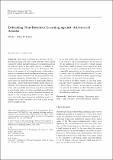Defending non-Bayesian learning against adversarial attacks
Author(s)
Su, Lili; Vaidya, Nitin H
Download446_2018_336_ReferencePDF.pdf (232.4Kb)
Publisher Policy
Publisher Policy
Article is made available in accordance with the publisher's policy and may be subject to US copyright law. Please refer to the publisher's site for terms of use.
Terms of use
Metadata
Show full item recordAbstract
Abstract
This paper addresses the problem of non-Bayesian learning over multi-agent networks, where agents repeatedly collect partially informative observations about an unknown state of the world, and try to collaboratively learn the true state out of m alternatives. We focus on the impact of adversarial agents on the performance of consensus-based non-Bayesian learning, where non-faulty agents combine local learning updates with consensus primitives. In particular, we consider the scenario where an unknown subset of agents suffer Byzantine faults—agents suffering Byzantine faults behave arbitrarily. We propose two learning rules. In our learning rules, each non-faulty agent keeps a local variable which is a stochastic vector over the m possible states. Entries of this stochastic vector can be viewed as the scores assigned to the corresponding states by that agent. We say a non-faulty agent learns the underlying truth if it assigns one to the true state and zeros to the wrong states asymptotically.
In our first update rule, each agent updates its local score vector as (up to normalization) the product of (1) the likelihood of the cumulative private signals and (2) the weighted geometric average of the score vectors of its incoming neighbors and itself. Under reasonable assumptions on the underlying network structure and the global identifiability of the network, we show that all the non-faulty agents asymptotically learn the true state almost surely.
We propose a modified variant of our first learning rule whose complexity per iteration per agent is
$$O(m^2 n \log n)$$
O
(
m
2
n
log
n
)
, where n is the number of agents in the network. In addition, we show that this modified learning rule works under a less restrictive network identifiability condition.
Date issued
2018-06-20Department
Massachusetts Institute of Technology. Computer Science and Artificial Intelligence LaboratoryPublisher
Springer Berlin Heidelberg